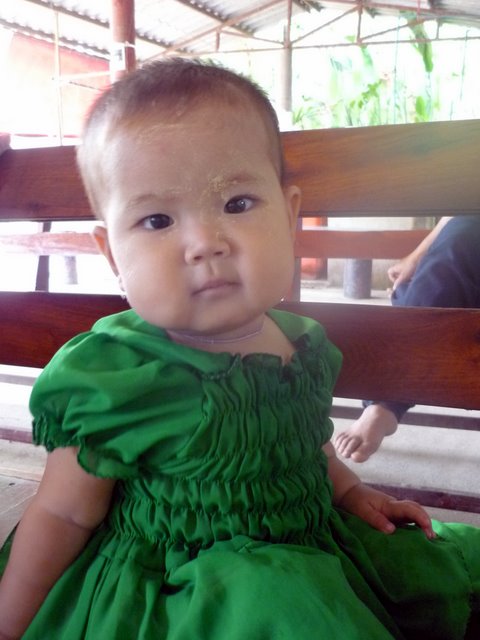Naw Say (mylomeningocele)
June 20, 2011 • Posted in BCMF Success stories
Naw Say was born at home in her family’s village, in Karen State, Burma. She was born with an abnormal growth (mylomeningocele) on her lower back. The growth was very soft when she was born and it has been getting bigger and harder as she grows. Her mother doesn’t know what caused the growth and she thought that it may disappear as Naw Say got older.
Naw Say’s parents heard from their friends who live near the Thai-Burma border that there was a big clinic on the Thai-side of the border (Mae Tao Clinic) which offers free medical treatment for people from Burma. They decided this was their only option to get their daughter treatment so they set out on the difficult journey from their village to the Mae Tao Clinic. They had to travel by boat, then in the back of a public utility vehicle and another boat to cross the river which forms the border with Thailand. Her parents had to borrow money from people in their village to afford the passage and Naw Say’s 18 year old sister took care of her four young siblings while her parents were away.
Naw Say’s father is a farmer and he grows rice for a living. They sell rice paddy and vegetables to get money when they need it. Her mother, father and older siblings go into the jungle to find the vegetables which they sell. They earn enough to survive and have just enough to send only one of their children to school (Naw Say’s 7 year old brother).
Naw Say’s mother was very worried about her daughter and what would happen to her in the future if the growth kept getting bigger. Their lives were filled with uncertainty when they left their village. They didn’t know if they could get Naw Say’s condition treated or how they would pay.
Naw Say’s parents took a leap of faith. Hearing about the Mae Tao Clinic gave them hope.
TREATMENT:
Naw Say and her mother reached the Mae Tao Clinic in October 2010 and Naw Say was quickly referred to the Burma Children Medical Fund (BCMF) program. Since being referred to BCMF, Naw Say and her mother travelled to Chiang Mai three times. The first time was for further investigation of her condition; the second was for scheduled surgery but unfortunately the hospital had a back log of emergency cases and her surgery was postponed. Third time lucky – on Naw Say’s third trip (May 2011), Naw Say underwent an excision and repair of the mylomeningocele on her lower back. A sac that was sticking out of her lower back that contained spinal cord and meninges (the tissues covering the spinal cord) was removed. The surgery lasted 6 hours and she was hospitalised for 10 days. However Naw Say had a complication that involved fluid leaking from her spinal column and she returned to the hospital in June 2011 for further surgery to correct the problem.

Naw Say’s ‘lump’
OVERALL EXPERIENCE:
Naw Say’s mother said she was impressed by the hospital in Chiang Mai because it looked very modern and therefore she felt the care her daughter was receiving must have been very expensive. On the day of Naw Say’s first surgery her mother cried because she did not understand what was happening as she sat in the waiting room hour after hour. However after the surgery was finished she was very happy as the doctor told her that the operation had been a success.
NAW SAY POST-SURGERY:
One of the risks that the doctor discussed with Naw Say’s mother before surgery was the possibility of nerve damage which could result in leg paralysis. Naw Say’s mother is very happy as post operatively her 10 month old daughter can feel and use her legs. She can now stand and hold herself up while balancing on furniture.
During her treatment in Chiang Mai, Naw Say’s father has been busy planting his rice fields as it is the wet season in Burma. He and Naw Say’s five older siblings are eagerly awaiting her return. Naw Say and her mother will be headed home on 15 July 2011 for the first time since her surgery.
When she grows up, Naw Say’s mother says that she would like her daughter to be a health professional so she can help others and to repay the care and treatment she was given. Naw Say’s father has already passed word on for his wife via telephone to thank BCMF on his behalf for helping his little girl. Every day Naw Say’s mother thinks about the individual people (BCMF’s supporters) that have helped her daughter and she prays to Buddha that they have a long and healthy life.


